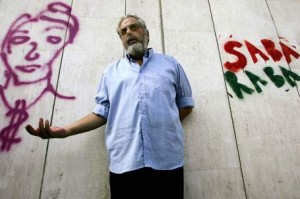 The National, December 26, 2009
The National, December 26, 2009
Have a seat at a café in Tel Aviv, known as the “first Hebrew city,” and your waitress will welcome you with ahlan, a standard Arabic greeting. Place your order and she’ll say sababa—”cool” to Israelis; “urge for a lover” in literary Arabic. When your meal comes, you might enjoy it so much that you’ll call it wahaat, “one” in Arabic, a Hebrew exclamation for singular, outstanding.
Ruvik Rosenthal, writer of a weekly column about the Hebrew language and author of the Comprehensive Slang Dictionary comments, “Arabic is queen of Israeli slang.” Rosenthal estimates that Hebrew-speakers use approximately 700 such words as part of their everyday speech.
Although slang changes with time, Hebrew peppered with Arabic isn’t a passing fad—Arabic had a firm foothold in the language long before Israel was established in 1948, Rosenthal explains.
The first Jewish immigrants to Palestine, who arrived from Europe in the late 1800s and early 1900s, saw the local population “not as enemies but as imitation objects.” These pioneers, Rosenthal says, wanted to do away with Yiddish, a language they viewed as “feminine.” Admiring the local dialect as “strong and masculine”, they began folding Palestinian Arabic into their speech.
“It went into all areas,” Rosenthal remarks, “it permeated [Hebrew].”
In the 1950s, the massive influx of Mizrachim, Jews from Arab countries, gave these words staying power while introducing more from places including Egypt, Morocco, and Iraq. “[Arabic in Hebrew] remained alive because of their Oriental identity,” Rosenthal says.
Food served as another entry point for migrating vocabulary, according to Dr. Gabriel Birnbaum, a senior researcher at the Academy of the Hebrew Language, introducing words like hummus, falafel, and arak. Occasionally, a Biblical Hebrew word was ignored in favor of a more pleasant-sounding Arabic one, like in the case of sesame, which Israelis call soomsoom.
Such words have been accepted as part of the lexicon, standing alongside Hebrew vocabulary with less obvious Arabic roots.
During the Middle Ages, when Hebrew was alive only as a written language, it absorbed a large amount of Arabic vocabulary. As Jewish scholars wrote about topics like philosophy and geometry, they often drew from Arabic texts, translating words as they went. For example, shever, the Hebrew word for fraction, comes from leshbor, Hebrew for “to break”—and this is the concept of the original Arabic.
When Eliezer Ben-Yehuda, commonly referred to as the father of Modern Hebrew, began reviving the spoken language in the late 1800s, he took some of these Arabic-based words. And he created new ones.
“[Eliezer] Ben-Yehuda loved to coin words from Arabic,” Dr. Birnbaum remarks. The Hebrew word for socks, garbaim, which Ben-Yehuda fashioned from the Arabic word garub, is just one example.
While the Academy of the Hebrew Language is a guardian of the formal language, Dr. Birnbaum comments, “We are happy Hebrew has slang—it is a vital component of any living language.”
Much of Hebrew slang retains its original definition, like yalla, which means “let’s go” in both Israel and Arab countries. Some expressions, however, have taken on new meanings. Basa, for example, refers to an obscene act in Arabic—but to Hebrew-speakers, it simply expresses disappointment.
Today, young Israelis also give this once-taboo word the trappings of formality, using basa as the basis for levaes, “to disappoint”, and conjugating it as they would any Hebrew verb.
Eventually, such a word could leave slang and move up a rung in the linguistic ladder, entering the “spoken language” category, according to Dr. Benjamin Hary, an associate professor of Arabic, Hebrew, and Linguistics at Emory University. This rule applies not only to Hebrew, but to Arabic, as well, he adds.
It’s happening already, perhaps, in Israel and the Occupied Territories, Dr. Hary says. In the West Bank, for example, Palestinians refer to roadblocks with the slang word mahasim, taking the Hebrew machsom, and pluralizing it as though it were Arabic.
While Hebrew is entering the Palestinian vocabulary as military-related slang, the speech of Israeli Arabs is full of everyday Hebrew. “In cities like Yafo, Nazareth, and Akko economic life is mixed—it’s not as separate as we think.”
And as Israeli Arabs speak more and more Hebrew, their linguistic heritage is threatened. “Inside of Israel, there are some places where Hebrew is so dominant, [there are] concerns about the continuation of Arabic. In Yafo, some children speak better Hebrew than Arabic, and some are barely learning written Arabic.”
Wael Kubtan, 38, is an Israeli Arab who was born and raised in the Yafo neighborhood that serves as the setting of the critically-acclaimed film Ajami. Learning Hebrew, he says, effects more than language, “It’s in the mannerisms—the body language, the way we dress, the way we talk—the Israeli attitude comes, too.”
Kubtan, who teachers Arabic to Israeli and international adult students, sees this as a problem—Israelis Arabs and Palestinians are drifting apart, culturally and linguistically, he says.
“It’s troublesome… I’m trying now to speak clear Arabic and not mix Hebrew as everyone else does.”
Photo of Ruvik Rosenthal: AP